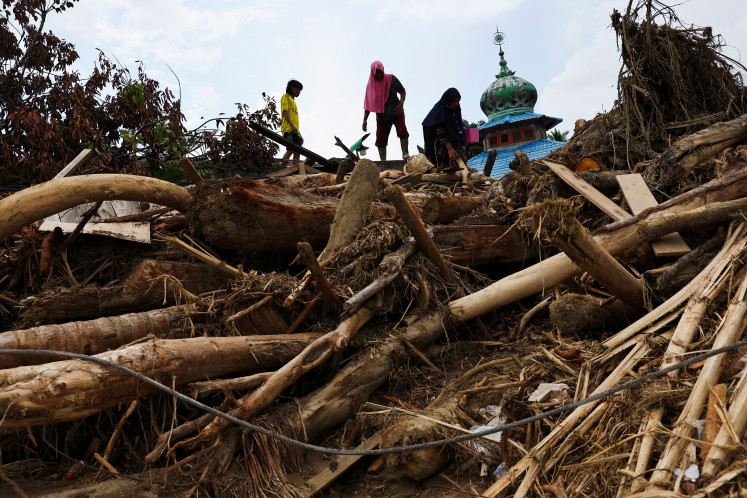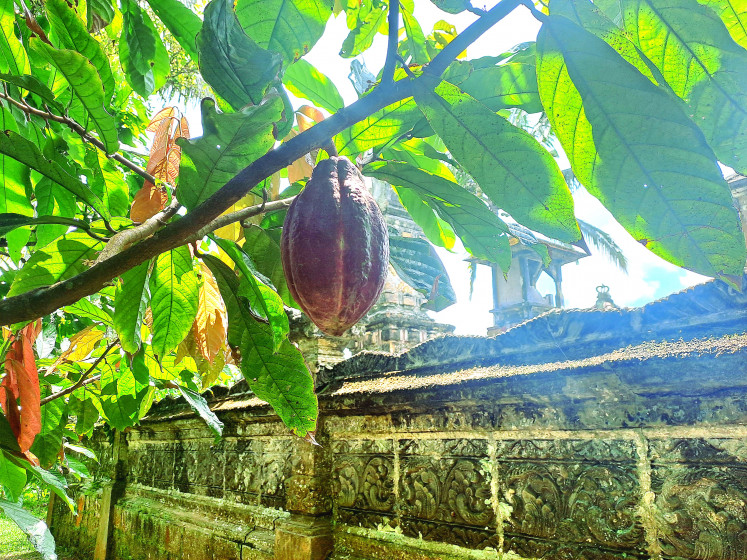Popular Reads
Top Results
Can't find what you're looking for?
View all search resultsPopular Reads
Top Results
Can't find what you're looking for?
View all search resultsEU defends stance on palm oil amid RI backlash
The European Union has defended its stance on palm oil and warned against any threat of retaliation by the Indonesian government, leading to a rise in trade tensions between the two jurisdictions
Change text size
Gift Premium Articles
to Anyone
T
he European Union has defended its stance on palm oil and warned against any threat of retaliation by the Indonesian government, leading to a rise in trade tensions between the two jurisdictions.
The EU, which is Indonesia’s largest palm oil customer, denied allegations that it had deliberately tried to undermine the market for the commodity, citing market demand as the reason for its problems.
“What causes those ups and downs in the palm oil market? The main factor is the market itself,” charge d’affaires ad interim of the EU mission in Indonesia, Charles Michel-Geurts, told the press in Jakarta on Thursday.
He cited rising demand for more sustainable products as consumers became more aware of the impact of deforestation on the planet. As a result, manufacturers have begun labeling their products to cater to consumer preferences.
“The EU as an institution, as a governance, has nothing to do with NGOs, or producers, it’s their choice and strategy in capturing market share,” he stated, adding that the zone had no legislation promoting a complete ban on palm oil products as it only regulated labeling.
Greenpeace Indonesia, meanwhile, said the organization had never campaigned for a total boycott of palm oil.
“We are not anti-palm oil, we are anti-deforestation,” head of Greenpeace Indonesia Global Forest Campaign, Kiki Taufik, told The Jakarta Post over the phone. “What we are campaigning for is for the market and consumers to use sustainably sourced palm oil because our environment and climate is at a crisis.”
The European Commission decided in March to completely phase out the use of palm oil by 2030 as it is considered a high-risk vegetable oil because of deforestation concerns.
It also slapped temporary duties of 8 percent to 18 percent last month on imports of biodiesel, a palm oil derivative produced by Indonesian companies, over allegations that palm oil companies in the country receive various incentives and special subsidies from the government.
Such decisions have irritated the Indonesian government, which has threatened to take “retaliation measures” against the bloc.
Trade Minister Enggartiasto Lukita said on Aug. 9 that he was recommending to an interministerial team a 20 percent-25 percent tariff on EU dairy products as the appropriate response to the EU’s countervailing duty on Indonesian biodiesel, Reuters reported.
He also pushed domestic airlines in mid-August to halt purchases of Airbus aircraft in retaliation for the EU’s curb on biodiesel, as reported by Bloomberg.
“What the WTO [World Trade Organization] does not allow is retaliation, which is what is suggested by the dairy products,” said the head of the economic and trade section of the EU delegation to Indonesia and Brunei Darussalam, Raffaele Quarto, adding that such retaliation would be subject to an investigation by the WTO.
“It would be damaging for Indonesia, it’s illegal and economically not a good move,” he stressed.
Representatives of the Trade Ministry could not be reached for comment when contacted by the Post on Thursday.
Indonesia Oil Palm Association (GAPKI) data showed that palm oil exports in the form of crude palm oil, biodiesel, oleo chemicals and other derivatives to the EU, constantly fell in the last few months. The exports amounted to 302,160 tons in May, 4 percent lower than the 315,240 tons in April, which also dropped 37 percent compared with exports in March.
GAPKI secretary-general Kanya Lakshmi told the Post that the EU’s regulations could continue to harm European demand for palm oil.
“The directive introduces a poor understanding of palm oil and it could spread to other palm oil products, causing demand from Europe to gradually slow,” she said.
However, Michel-Geurts said that the EU was still very much dependent on palm oil as industries such as food manufacturing and cosmetics used the vegetable oil as one of their main ingredients.
He then suggested Indonesian palm oil players “get into the game” of creating a positive image for palm oil just as other industries have done.
“Wheat producers don’t like the private campaign for gluten-free, neither do sugar producers with sugar-free campaigns or chemical companies with growing awareness about organic and chemical-free food […] There is no EU legislation promoting that. Our only legislation is on labeling,” he said.










